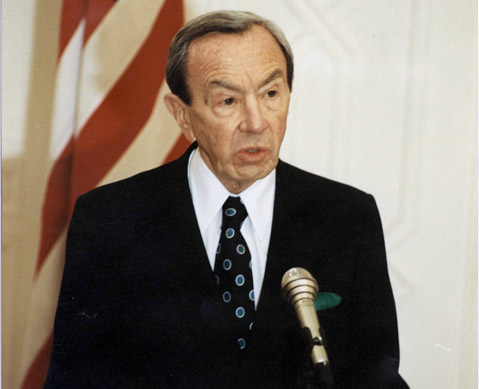
Warren M. Christopher, lawyer, negotiator, statesman, private counsel, and public servant, died on Friday night, March 18, 2011, in Los Angeles. He was 85 and had been ill with kidney and bladder cancer.
Mr. Christopher served as the Secretary of State from 1992 till 1996 during President Bill Clinton’s first term. During the Carter administration, Christopher was the nation’s chief negotiator for the 1981 release of American hostages in Iran, who were held for a 444-day period of captivity. His dramatic negotiations with Iran continued into the waning hours of the Carter Administration as he and his team secured the release of the remaining 52 hostages on January 20, 1981, at the precise moment that Ronald Reagan was completing his First Inaugural Address and being sworn in as Jimmy Carter’s successor. On some national networks, the two events were displayed in “side-by-side” coverage. As President Carter’s Secretary of State, Christopher also helped win ratification of the Panama Canal treaties, presided over the normalization of diplomatic relations with China, and conducted intricate and long running negotiations in the Middle East and the Balkans.
Even in light of his many major achievements on the world stage, Warren Christopher’s legacy of influence in the Los Angeles area was perhaps more profound. Recognized as a meticulous and restrained “lawyer’s lawyer,” for the past 50 years, Mr. Christopher was a towering figure in Los Angeles and Southern California legal and political circles. He was a California native, educated at the University of the Redlands, USC, and Stanford, and he maintained residences in Los Angeles and in Summerland.
In the mid 1960s, Christopher investigated riots and racial unrest in the Watts district of Los Angeles; this work had an important influence on the Lyndon Johnson Administration’s urban policy. But that was only a prelude for Christopher. In 1991, after the severe beating by police officers of a black driver, Rodney King, riots and civil unrest in Los Angeles prompted civic leaders to choose Christopher to head an investigative commission to examine the practices of the Los Angeles Police Department. What became known as “the Christopher Commission” was a 100-day study of police brutality and corruption that ended by proposing major reforms to the Los Angeles Police Department. These steps included the creation of an Inspector General’s post to oversee police conduct and a significant increase in civilian supervision of Police Department policies and practices. Most controversially, the Christopher Commission report called upon LAPD Chief Daryl Gates—whose 13-year tenure as Chief was turbulent and polarizing—to step down.
Gates, who resisted the reforms proposed by the Christopher Commission, was replaced as Chief of Police. In the years since the release of the Christopher Commission Report, nearly every one of its major recommendations has been implemented. The Christopher Commission report now stands as model for civilian oversight over urban law enforcement.
The impact of the Christopher Commission Report has been far-reaching. John Mack, the former civil rights activist who is now the presiding President of the Los Angeles Police Commission, the civilian board that oversees the LAPD, has described the creation of the Report as “the single most important event in changing the culture of the LAPD.”
The giant multi-national Los Angeles law firm O’Melveny & Myers announced Christopher’s death; he had been a senior partner and also a former managing partner of the firm. He was instrumental in leading O’Melveny during its largest sustained period of growth in the 1980 and 1990s. At the law firm, Christopher was well known for his grace and decorum—and for keeping track of the firm’s thousands of lawyers and staff with a private notecard system. Christopher’s famous cards were what grounded an emblematic feature of his dedication to the firm: his instant recall of the small, but telling, details of each person’s background and service.
With a legal career spanning 60 years, Christopher leaves a great legacy of achievement to his law firm, his city and his nation. Long regarded as a living legend in legal circles for his tireless and protean work, often behind the scenes, for resolution and for progress, Christopher chose to describe himself as a quiet family man. He will be remembered by those who knew him, and many who did not, as a quintessential public servant.
Christopher is survived by his second wife, Marie, whom he married in 1956 after his first marriage ended in divorce; and their three children, Scott, Thomas and Kristen. He also is survived by a daughter from his first marriage, Lynn Collins; and five grandchildren. Private services are pending.
